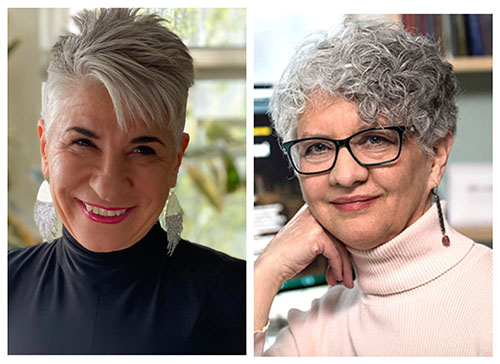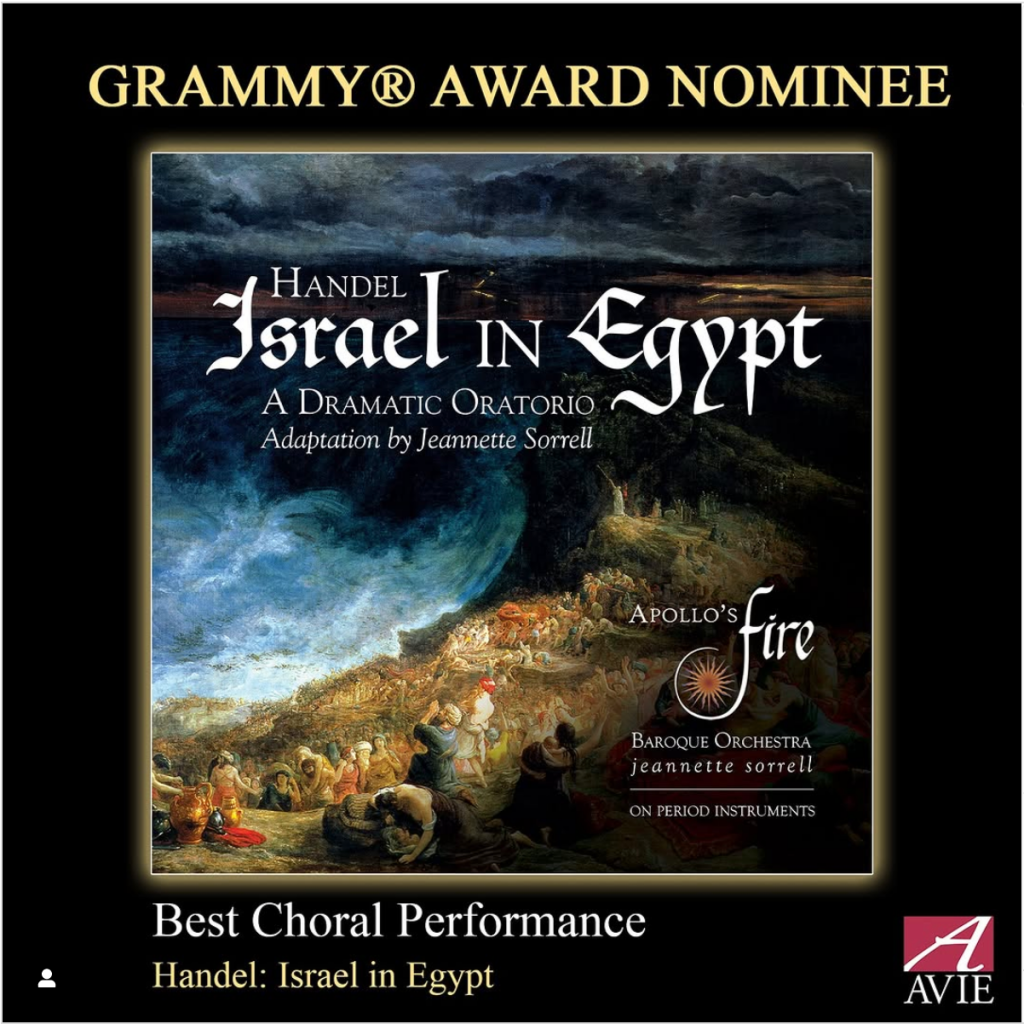by Mike Telin

While Cleveland artists have been well-represented at the Grammys for some time, when the 67th award ceremony is held at the Crypto.com Arena in Los Angeles on February 2 and broadcast at 8 pm EST on CBS, there will be two special reasons to pay attention.
Elaine Martone (left) and Erica Brenner (right), who have been among past Grammy nominees and winners, have both been nominated this time around for Producer of the Year, Classical (Category 82).
Martone’s accomplishments include nine recordings — The Cleveland Orchestra, Cincinnati Pops, CIM faculty pianist Gerardo Tessionnière, the Baylor University Wind Ensemble, and trombonist Sachar Israel.
Brenner’s portfolio includes two Apollo’s Fire recordings — Biber’s Mystery Sonatas with Alan Choo and Handel’s Israel in Egypt (which has also been nominated for Best Choral Performance), as well as albums featuring pianist Orli Shaham, the CORE Ensemble, and a brass ensemble album honoring the memory of trumpeter Ryan Anthony.
In addition to being close personal friends, Martone and Brenner have much in common professionally. Both were trained as classical musicians — Elaine as an oboist and Erica as a flutist. Both came to Cleveland to study in hopes of pursuing an orchestral career. Both found themselves in the recording industry working at Telarc Records — founded in 1977 by classically trained musicians and former teachers Jack Renner and Robert Woods. And after the dissolution of Telarc, both found themselves working as independent producers.
I caught up with Elaine Martone and Erica Brenner on Zoom
Mike Telin: Congratulations. You’re both up for Producer of the Year Classical. Elaine, you have won this category in the past, correct?
Elaine Martone: Right. I think this is my sixth nomination for Classical Producer and I’ve won it twice. But this is Erica’s first nomination in this category which is exciting and so well-deserved.
Erica Brenner: Thanks so much. And to be in the presence of Elaine and fellow nominees Christoph Franke, Morten Lindberg, Dmitriy Lipay, and Dirk Sobotka is very humbling.

Often I think we need to form some kind of producer collective where we can share best practices — how much we should charge for what. We just make it up and we always have.
But I’ve got Erica to bounce ideas off of — we are such good friends and great collaborators and we share our thoughts about what works. And sometimes we need to cry on each other’s shoulders.
I completely agree with Erica that the people in our category are awesome and it’s humbling to be in this world.
MT: Erica, do you have anything to add?
EB: It’s amazing that Elaine and I get to do this together. But, so many people ask, what does a producer do? Sometimes I have a hard time even answering that question because there’s no written manual for being a producer. It depends on the project, the artists, and what they need.
A recording session is a strange place. The artists are not performing, but they are asked to deliver something that’s meaningful and vibrant and wonderful in an environment where they have to do things over and over again. So a lot of what I need to do is to be encouraging and let them bring their best to the task.

EM: And to have fun doing it. When we’re at our best it’s like we’re equal parts cheerleader, coach, guidance counselor, and philosopher. We also try to bring fun and levity to it.
As musicians, we spend a lot of time in a practice room by ourselves, and we’re used to being criticized, because that’s the game. That’s how we grow. But we’re not necessarily used to our teachers telling us how great we are.
I did a recording session with a musician a few years ago who said to me afterwards, ‘My goodness, I feel like I went back to school and had a masterclass. As an adult, it was like getting coaching, having somebody point out all the good things you do, and I could really use that on an ongoing basis.’
I started thinking about how cool it is to get to do that for somebody. As adults, if you have a good working relationship with your boss, you may get reviewed once a year and hopefully they may tell you what you’re doing well. But they also tell you what you don’t do well and that’s what Erica and I do as producers. I think it’s so cool to get to say to someone, ‘That was just so beautiful — can you do it again please?’
MT: Would you say that your many years being trained as a musician has benefited you as a producer?
EB: I was hired at Telarc in the first place because Elaine and I carpooled to Canton Symphony rehearsals and concerts. After two years of playing together and talking about music together, when I was about to go off to grad school and get my degree in flute performance, Elaine said, ‘if you ever come back to Cleveland, call me because I think you’d be good at editing. You’ve got musical sensibilities that match mine pretty closely.’
EM: I don’t know how you can be a classical producer if you’re not a classically trained musician. It’s just number one.
Number two is, I believe you have to like artistic personalities. Not everybody does, but I like artists. I like what they bring to the world. And I like being in that world and bringing out somebody’s best.
The other thing that helped me is to watch Franz Welser-Möst when he’s talking to the orchestra and he brings in references from philosophy, art, history, and what’s going on in culture. I try to bring in analogies myself — you can’t just tell somebody ‘please do that again’ three times. Why do I want them to do it again?
Life also trains you to be a good producer. Even now working at the Cleveland Orchestra doing the Adella productions for their platform I feel like I keep learning and adding more tools to my toolkit. And it’s a privilege to keep learning at my age.
EB: That’s true. The other thing is that when I was trained at Telarc, I had a group of recording engineers that were always there and always reliable. But when the company sort of blew up, and we all went our separate ways, I was suddenly thrust into working with many different recording engineers. I had to figure out how to do that, and it took me a while because I had to learn new languages and adjust the way I said things. Sometimes I was successful and sometimes not. But speaking of new challenges and learning to do something new — learning to work with new engineers was a real gift because it taught me so much.
EM: That’s a great point. At Telarc we had the luxury of working with like-minded people. Since Erica and I went out to be freelance producers, I’ve worked with something like 25 different engineers, maybe more. And in a way, we all have to learn a common language.
MT: Thank you both. This has been fascinating. And again, congratulations and best wishes to both of you.
EB: It’s the greatest privilege to be in this category with not only my mentor, but my dearest friend.
EM: I feel exactly the same way.
Published on ClevelandClassical.com January 30, 2025
Click here for a printable copy of this article



